France Warns Over Iran’s Uranium As IAEA Chief Is Set To Visit Tehran
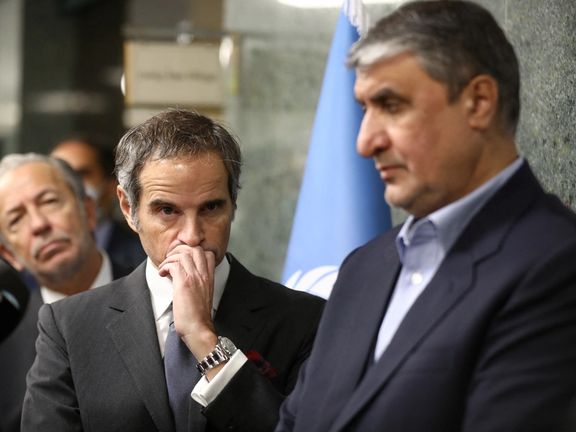
France has called news of Iran’s high level uranium enrichment “very concerning”, as the head of the UN nuclear watchdog is set to hold talks in Tehran Saturday.

France has called news of Iran’s high level uranium enrichment “very concerning”, as the head of the UN nuclear watchdog is set to hold talks in Tehran Saturday.
Anne-Claire Legendre, Spokesperson of the French ministry of foreign affairs said news of Iran enriching uranium to near 84 percent is “extremely serious".
“This report states that the direction Iran is taking is very concerning,” she said on Thursday, about the International Atomic Energy Agency’s (IAEA) monitoring result.
IAEA chief, Rafael Grossi, will meet Iran’s President Ebrahim Raisi in Tehran on Saturday at the invitation of the government.
The IAEA hopes to “relaunch the dialogue” on the country’s atomic work in the wake of news that Iran is dangerously close to producing weapon’s grade uranium. The visit could fill a vital diplomatic vacuum in the wake of the breakdown of talks to revive the JCPOA with the US.
The global body confirmed Tuesday that it has detected uranium particles with a purity of 83.7%, while to produce a nuclear bomb uranium with a purity of 90% is needed. However, last week, Tehran claimed it had not made any attempt to enrich uranium beyond 60 percent.
It is possible that the "spike" was accidental, though this one was relatively large, diplomats said.
The IAEA has blamed Iran for failing to inform the body of substantial changes made to the two clusters of advanced centrifuges enriching uranium to up to 60% purity.
The Islamic Republic has been enriching uranium well over the limits laid down in the landmark 2015 deal with the P5+1 group of countries, which started to fall apart when Washington withdrew from it in 2018.
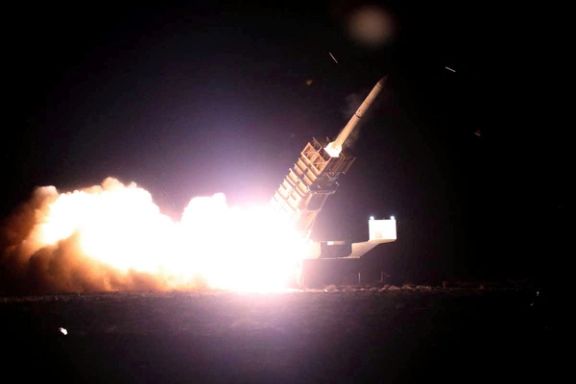
Washington will never allow Iran to acquire a nuclear weapon, the State Department has reiterated, while still insisting that diplomacy with Tehran is preferable.
State Department spokesperson Ned Price told reporters during his press briefing Wednesday that US policy is clear. “President Biden has a solemn, steadfast commitment to the fact that Iran will never acquire a nuclear weapon. We will never allow that to happen. We continue to believe that the way to address this challenge in a way that is durable, in a way that is permanent, is through diplomacy.”
However, increasingly more members of congress from both sides of the isle are demanding a change of policy regarding negotiations with the Islamic Republic to revive the 2015 nuclear accord, known as the JCPOA. US lawmakers are pushing a few initiatives for bills to censure the Iranian government for its brutal suppression of protests and other malign activities.
Some observers opposed to the JCPOA and the Iranian regime argue that the Biden administration policy of keeping the diplomatic option on the table appears increasingly untenable as Tehran crosses red lines set by the West, including weapons shipments to Russia.
Price tried to drive home the message that for the US all options are on the table. In answering a reporter he said that although diplomacy was “the most effective way”, the administration has “been very clear that we will, through all means necessary, ensure that Iran never acquires a nuclear weapon.”
The latest example of a worrying development in Iran is a report by the UN nuclear watchdog, the IAEA saying that they found uranium particles enriched close to 84 percent, while Iran had previously not surpassed 60-percent enrichment.
Price said, “we are in close contact with our allies and partners in Europe and the region, the broader region, as we await additional details from the IAEA.”
The IAEA Board will meet next week and the agency will submit the official report to member states. Iran and Russia claimed on Wednesday that the issue was a misunderstanding and “has been resolved,” while at the same time they said IAEA chief Rafael Grossi will visit Tehran on Friday. The claims have not been confirmed by the IAEA.
If the UN watchdog submits a critical report, saying there is no satisfactory answer to its finding of highly enriched uranium, the US and its allies will be forced to take action, including triggering the return of international sanctions at the United Nations. Iran has already been censured twice by the Board of Governors in 2022, and another critical resolution will not be taken seriously.
The spectre of a military attack against Iran’s nuclear program has become larger in recent weeks, as Israel has signaled continued preparations to take action if necessary.
A US Defense Department official warned this week that the Islamic Republic could produce enough highly enriched uranium for one bomb in less than two weeks.
The Biden administration has drawn closer to Israel in recent weeks, conducting large-scale joint military exercises in January.
The US ambassador to Israel Tom Nides said in February that “As President [Joe] Biden has said, we will not stand by and watch Iran get a nuclear weapon, number one. Number two, he said, all options are on the table. Number three, Israel can and should do whatever they need to deal with, and we’ve got their back.”
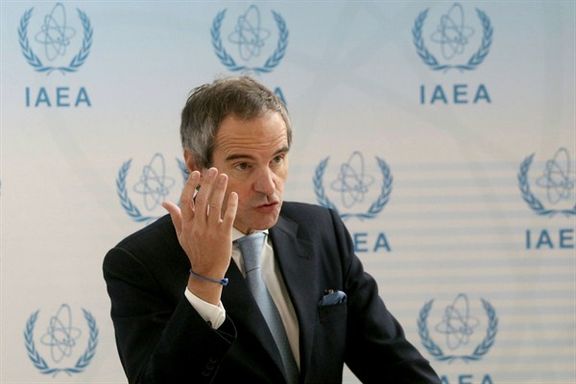
The head of the International Atomic Energy Agency (IAEA) Rafael Grossi will visit Iran Friday for high-level meetings, the semi-official Fars news agency reported Wednesday.
The visit comes amid discussions with Tehran on the origin of uranium particles enriched to up to 83.7% purity, very close to weapons grade, at its Fordow enrichment plant, a report by the watchdog seen by Reuters confirmed on Tuesday.
Iran has rejected the claims of enrichment up to that level.
Iran began violating the 2015 nuclear deal’s (JCPOA) enrichment limit set at 3.67 percent in 2019 when the Trump administration imposed full oil export sanctions, but until the Biden administration came to office higher enrichment had stayed at around 5 percent.
The head of Iran’s Atomic Energy Organization, Mohammad Eslami, said on Wednesday that the Islamic Republic's production is at 60 percent according to state media.
Iranian officials have been insisting that a few particles are sometimes enriched beyond set limits, but the quantity is negligible. Eslami repeated the same argument on Wednesday. It is not clear if the IAEA agrees with this explanation.
The UN watchdog has been demanding other explanations from Tehran about its secret nuclear work before 2003 and so far there has been no resolution.
Talks to revive the JCPOA reached an impasse last September while Iran continues to stockpile 60-percent enriched uranium. It is estimated that it can reach weapons grade enrichment in a matter of weeks and can produce four nuclear warheads.
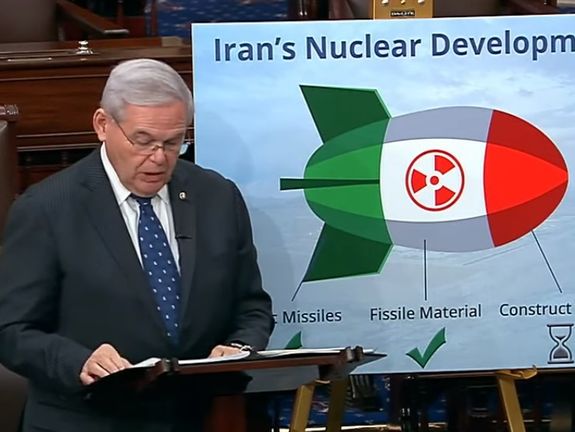
US senators are calling on the international community to take more punitive measures to weaken the Islamic regime and its influence in global conflict.
In an exclusive interview with Iran International, Senator Josh Hawley said the US and global community must do more to remove power from the Islamic regime and work more closely with opposition figures in the country.
He criticized the Biden Administration for its JCPOA policy, saying that Washington must empower its allies in the region instead of holding talks with Iran.
Hawley also expressed support for the Iranian protesters. "We want to stand with them,” he said.
Hawley is one of several US officials calling for firmer action against Iran in the wake of the breakdown of talks to revive the nuclear deal.
Following news that Tehran could be just days away from producing a nuclear bomb, Senator Bob Menendez said he hopes the Biden administration will make a strong shift in its policies towards Iran.
“The reality is the Iranians keep moving in a direction that confronts the world not only in its enrichment … but Iranian drones are part of creating death and destruction,” he said, referring to recent reports that Iranian drones are being used in the war on Ukraine.
Menendez went on to add that Iranians continue their proxy and nefarious activities in the region, including arming the Houthis in Yemen, Hezbollah in Lebanon and Hamas in Gaza.
It is time, he says, for the Biden administration to understand that no matter the level of diplomatic efforts, Iran is not changing its ways.
“There should be a clear and decisive set of actions that sends a message to the regime in Iran that there are real consequences [to their actions].”
Reporting by Arash Alaei - Washington DC
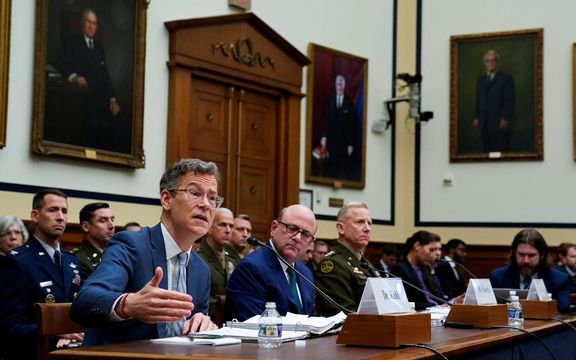
Iran can produce enough enriched uranium for one nuclear bomb in “about 12 days,” a top US official warned Tuesday as lawmakers also expressed deep concern.
Under Secretary of Defense for Policy, Colin Kahl, said: “Back in 2018, when the previous administration decided to leave the JCPOA it would have taken Iran about 12 months to produce one bomb's worth of fissile material. Now it would take about 12 days.”
It is the most alarming warning yet of the threat Iran's nuclear capabilities pose. In September, Israel’s then defense minister, Benny Gantz, told the International Atomic Energy Agency in Vienna that Iran would be able to produce enough enriched uranium to make three nuclear warheads within a few weeks.
US officials have repeatedly estimated the time it would take to acquire the fissile material for a nuclear bomb to be a matter of weeks but have not yet been as specific as Kahl was. Speaking to a House of Representatives hearing, he admitted that "Iran's nuclear progress since we left the JCPOA has been remarkable,” sending a clear warning that the Islamic republic had become a global threat.
Iran began violating the JCPOA enrichment limit set at 3.67 percent in 2019 when the Trump administration imposed full oil export sanctions but until the Biden administration came to office higher enrichment had stayed at around 5 percent.
In early 2021, Tehran toughened its position and said it would begin to enrich uranium to 20 percent purity, as the new US administration signaled its readiness to open talks to revive the JCPOA. Later Iran increased enrichment to 60 percent, which has no civilian use.
Kahl said that though the US would prefer to take the diplomatic approach to resolving the nuclear issue, it was unlikely since the recent breakdown in talks meant that “right now, the JCPOA is on ice”.
Talks to revive the JCPOA that began in April 2021 reached a deadlock last September and the administration insists it is no longer focused on reviving the accord.
The UN nuclear watchdog, the International Atomic Energy Agency (IAEA) that monitors Iran’s nuclear program was quoted Tuesday as confirming that its inspectors have found traces of uranium enriched to 84 percent – just a short step away from 90-percent enrichment needed for bomb material.
Many lawmakers from both sides of the aisle oppose lifting US economic sanctions on a country that is engaged in repression at home and “malign activities” abroad, including arming Russia with drones and possibly other weapons.
Democratic Senator Bob Menendez, Chairman of the foreign relations committee told Iran International Tuesday that the Biden administration should understand that rather than Iran changing its way, “on the contrary, it is doubling down”.
He did, however, express hope that Iran’s alarming 84-percent enrichment would bring about a shift in Biden’s policy.
Iran’s wider role in global conflict was addressed on Tuesday at a media call with Deputy Assistant Secretary of Defense Dana Stroul, who told reporters that the US and its allies are moving to treat the Islamic Republic as a "global threat”, because of its growing military alliance with Russia.
"We are now at a point where Iranian threats are no longer specific to the Middle East, but a global challenge," she said, reinforcing recent warnings by senior administration officials.
"It is reasonable to expect that the tactics, techniques and procedures that the Iranians are learning and perfecting in Ukraine will one day come back to our partners in the Middle East, which is why we are increasing cooperation now, intelligence sharing, understanding these networks and increasing our collective defensive capabilities so that we are prepared to counter these threats in the region," she added.

The UN nuclear watchdog is in discussions with Iran on the origin of uranium particles enriched to up to 83.7%, a report by agency confirmed on Tuesday.
The report seen by Reuters is the first official indication by the International Atomic Energy Agency (IAEA) that indeed Iran’s high level of enrichment, very close to weapons grade is true.
"Iran informed the Agency that 'unintended fluctuations in enrichment levels may have occurred during transition period at the time of commissioning the process of [60%] product (November 2022) or while replacing the feed cylinder'. Discussions between the Agency and Iran to clarify the matter are ongoing," the confidential International Atomic Energy Agency report said.
Bloomberg reported on February 19 that IAEA inspectors had come across uranium particles enriched to 84 percent, but the agency had not confirmed or denied the report since then.
Bloomberg said that the IAEA needed to determine whether the higher-grade enrichment was intentional or the result of unintended technical processes. Earlier in February, inspectors had found an unusual set-up in interconnections of enrichment machines, called centrifuges.
The spokesman for the Atomic Energy Organization of Iran immediately rejected Bloomberg's report as "distortion of facts" and said, "We have not enriched uranium to purity levels above 60 percent so far." He added that the IAEA has informed Tehran that "the presence of uranium particles with above 60-percent purity is common in sampling."
However, this week Iranian officials began to argue that such unintended higher-level enrichment sometimes happens in the fast-spinning centrifuge machines.
Iran’s Nuclear Agency Spokesman Behrouz Kamalvandi said on Friday [Feb 24] that finding highly-enriched uranium particles in the pipes connecting centrifuges was a “normal issue.”
“For example, we are producing 5 percent enriched [uranium], 11 percent particle is seen in it, or we are producing 20 percent [enriched uranium], 47 percent particle is seen in it. We had several correspondences about this in the past… it’s a natural thing in enrichment,” he noted.
“The machine is spinning fast. If the amount of the feed decreases for a moment, the enrichment will increase by a few percent; but it doesn’t matter because the end product is what matters.”
Iranian officials also said that they expect IAEA inspectors and possible its director Rafael Grossi to travel to Tehran, but did not specify that any visit would be related to the highly enriched particles.
In the past two years, the Islamic Republic has reduced IAEA’s monitoring access to its nuclear installations and has violated limits set by the 2015 nuclear accord (JCPOA) with world powers that kept enrichment at 3.67 percent. Tehran began violating the limit in 2019, when the US imposed full oil export sanctions after withdrawing from the JCPOA.
Nearly two years of diplomatic attempts to restore the deal have failed, with the West also becoming critical of Iran’s bloody crackdown on popular protests and its supply of military drones to Russia.
Any of the three European signatories of the JCPOA, the United Kingdom, France or Germany could trigger a UN Security Council mechanism enshrined in the agreement, to reinstate international sanctions on Iran for its enrichment violations.
The IAEA Board of Governors will have its next meeting on March 6 and a report on Iran will be discussed. If the new violation is presented at the meeting, Western countries may decide to take the issue to the Security Council.